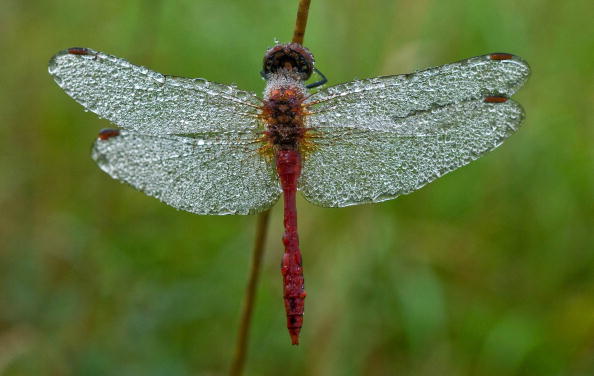Scientists have uncovered the physics-defying secret of insect wings


A free daily email with the biggest news stories of the day – and the best features from TheWeek.com
You are now subscribed
Your newsletter sign-up was successful
Not even the best pilot in the world can fly an airplane like the erratic path of an insect, and now scientists know why — bugs are simply exempt from the same laws of aerodynamics that apply to airplanes.
"We've known for quite a while that the aerodynamic theory for airplanes doesn't work so well in predicting the force of lift for flapping wings. We found that the drag or wind resistance also behaves very differently, and we put together a new law that could help explain how insects move through the air," assistant professor at New York University's Courant Institute of Mathematical Sciences, Leif Ristroph, told Futurity.
Researchers had to go back to the drawing board to figure out the significance of wing thrust on overcoming aerodynamic drag. While an airplane, with its static wings, must increase its thrust fourfold to double its flight speed against wind resistance, a bug only needs to double its thrust to go twice as fast due to having a drag "that is in direct proportion to its flight speed," Ristroph said.
The Week
Escape your echo chamber. Get the facts behind the news, plus analysis from multiple perspectives.

Sign up for The Week's Free Newsletters
From our morning news briefing to a weekly Good News Newsletter, get the best of The Week delivered directly to your inbox.
From our morning news briefing to a weekly Good News Newsletter, get the best of The Week delivered directly to your inbox.
To understand this, though, the NYU researchers actually built robotic wings to measure the way the air flowed and where the forces were acting. And now that they know more about how the drag on the wing acted more like a thrust in some instances, they think they may be able to design "tiny flying robots that mimic the wing motions of insects," Futurity reports.
Hey, at least robotic bugs don't sting. If you want to learn more — and are undaunted by the title "Linear drag law for high-Reynolds-number flow past an oscillating body" — check out the full study with diagrams in Physical Review Fluids, here.
A free daily email with the biggest news stories of the day – and the best features from TheWeek.com
Jeva Lange was the executive editor at TheWeek.com. She formerly served as The Week's deputy editor and culture critic. She is also a contributor to Screen Slate, and her writing has appeared in The New York Daily News, The Awl, Vice, and Gothamist, among other publications. Jeva lives in New York City. Follow her on Twitter.
-
 Samurai: a ‘blockbuster’ display of Japanese heritage
Samurai: a ‘blockbuster’ display of Japanese heritageThe Week Recommends British Museum show offers a ‘scintillating journey’ through ‘a world of gore, power and artistic beauty’
-
 BMW iX3: a ‘revolution’ for the German car brand
BMW iX3: a ‘revolution’ for the German car brandThe Week Recommends The electric SUV promises a ‘great balance between ride comfort and driving fun’
-
 Munich Security Conference: a showdown between Europe and Trump?
Munich Security Conference: a showdown between Europe and Trump?Today’s Big Question Report suggests European leaders believe they can no longer rely on the US for military support – but decoupling is easier said than done
-
 Epstein files topple law CEO, roil UK government
Epstein files topple law CEO, roil UK governmentSpeed Read Peter Mandelson, Britain’s former ambassador to the US, is caught up in the scandal
-
 Iran and US prepare to meet after skirmishes
Iran and US prepare to meet after skirmishesSpeed Read The incident comes amid heightened tensions in the Middle East
-
 EU and India clinch trade pact amid US tariff war
EU and India clinch trade pact amid US tariff warSpeed Read The agreement will slash tariffs on most goods over the next decade
-
 Israel retrieves final hostage’s body from Gaza
Israel retrieves final hostage’s body from GazaSpeed Read The 24-year-old police officer was killed during the initial Hamas attack
-
 China’s Xi targets top general in growing purge
China’s Xi targets top general in growing purgeSpeed Read Zhang Youxia is being investigated over ‘grave violations’ of the law
-
 Panama and Canada are negotiating over a crucial copper mine
Panama and Canada are negotiating over a crucial copper mineIn the Spotlight Panama is set to make a final decision on the mine this summer
-
 Why Greenland’s natural resources are nearly impossible to mine
Why Greenland’s natural resources are nearly impossible to mineThe Explainer The country’s natural landscape makes the task extremely difficult
-
 Iran cuts internet as protests escalate
Iran cuts internet as protests escalateSpeed Reada Government buildings across the country have been set on fire
